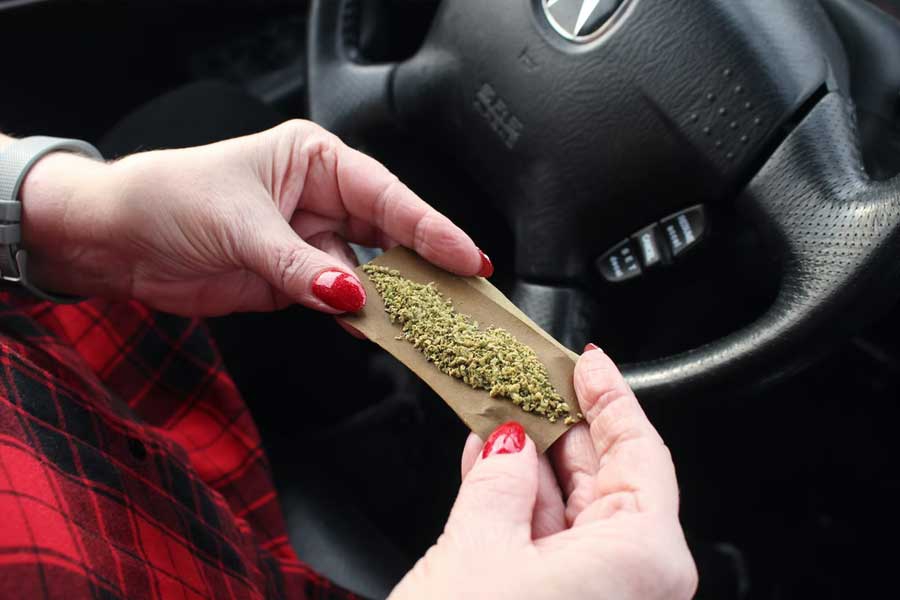In the same way that you can be given a random breath test for alcohol, you can also be pulled over for a random roadside saliva test to test for the presence of any relevant drugs in your system.
If you are caught driving with the presence of a relevant drug in your system, you will be required to go to court and your licence will be disqualified. This guide seeks to give you an overview of the types of drug driving charges and the penalties the court may impose. This guide is in relation to Queensland law only. We have a full article on drug driving that will help explain the consequences of pleading guilty and what you can do to reduce the disqualification period.
What is a relevant drug?
In Queensland a relevant drug is one of 3 drugs:
- Methylamphetamine – also known as speed or ice
- MDMA – the active ingredient in ecstasy
- THC – the active ingredient in cannabis
Types of drug driving
In Queensland we have 2 types of driving charges relating to the presence of drugs in your system, these are;
- Driving with a relevant drug present
- Driving under the influence of a drug
Driving with a relevant drug present
In Queensland we have a zero tolerance policy for driving with a relevant drug present in your system. This means that any trace of a relevant drug in your system will result in you being charged.
As the name of the charge suggest the police are not required to prove that there was a particular concentration of the relevant drug in your system at the time or driving, merely that the drug was present.
If the results of a drug driving test comes back positive it is irrelevant whether your driving was affected by having illicit drugs in your system. This means that for example, if you consume marijuana a couple of weeks before being tested you will still be charged with drug driving if the results are positive (marijuana can stay in your system for up to 40 days).
However, saliva tests are designed only to react to the active ingredient of a drug. Therefore the period in which drugs can be detected varies depending on quality and quantity of the drug that has been ingested, the period of time since taking the drug and the
Driving under the influence of a drug
Driving under the influence of a drug is the more serious drug driving offence. This requires police to show that at the time of driving you were intoxicated by a drug and that it was measurably affecting your ability to operate the vehicle.
If a police officer suspects your ability to drive has been affected by a drug you may be required to provide a specimen of blood for analysis.
You can be charged with driving under the influence of any type of drug not just the relevant drugs listed above.
If you are charged with driving under the influence of a drug we would expect the QP9 or police report to indicate that you were showing indicia of being affected by the drug including;
- The manner of driving
- Your physical condition and appearance
- Your behaviour and attitude
- Your speech being slurred
- Lapses in memory
Whilst it is common for the police to seek a blood or saliva test to determine the presence of a drug it is legal for them to charge you purely based on indicia.
What happens after you’ve been caught?
If you are caught driving with a relevant drug present in your system your licence will be immediately suspended for 24 hours. This means you are not able to drive for that period and if you do you risk being charged with driving while suspended.
If you are charged with driving under the influence of a drug your licence will be immediately suspended until your matter is finalised in court.
In certain circumstances, it is possible to apply for a special licence which will allow you to drive before your matter is finalised in court. This is called a section 79E order and is only available to people charged with drug driving who hold an open licence. You are not able to apply for a section 79E if you hold a provisional or learner’s permit or you already have a charge for drink/drug driving still before the courts.
Are you eligible for a work licence or other permit to driving during your disqualification?
You may be eligible for a work licence if you have been charged with drug driving and meet certain criteria. To find out more information about whether you are eligible we recommend you read our essential guide to obtaining a work licence:
Going to court
Generally most court matters follow this procedure;
- The court will generally start at 9:00am
- From just after 8:30am there will be a police prosecutor in the court room giving people their QP9 (what is a QP9 see our article here) and asking people if they are pleading guilty, not guilty or seeking an adjournment
- Once the court starts your name will be called at some point
- The court will then ask you if you are pleading guilty, not guilty or seeking an adjournment.
- If you are seeking an adjournment then the court is quite willing to grant an adjournment on the first occasion the matter is heard in court. If you seek further adjournments the court will need to be convinced you have a valid reason.
- If you are pleading guilty then the guilty plea can usually be conducted there and then. The police prosecutor will provide the court with a verbal overview of what occurred and then tender your criminal and traffic history (if you have any). You can then address the court on what occurred and the penalty to be imposed. The types of things that the court might be interested in hearing from you in regards to the penalty included.
- Why the offence occurred
- What you do for living
- How much money you make a week
- The impact a disqualification will have on your family and personal life
- The impact a disqualification will have on your employment or education
- Addressing any similar charges you have previously committed
What penalties can the court impose?
The table below sets out the disqualification ranges and maximum fine the court can impose for a first offence.
|
Charge |
Disqualification period |
Maximum fine |
|
Driving with a relevant drug present |
1 – 9 months |
$1929 |
|
Over the general alcohol limit (BAC over 0.05 but under 0.10) |
Minimum 6 months |
$3,859 |
What can I do help reduce my penalty?
We also strongly suggest you attend some form of driving course before your court date. We recommend the Queensland Traffic Offenders Program (“QTOP”). This course can be done online or in person. All the details including how to enrol are on their website at www.qtop.com.au .
The program is designed to increase the understanding of participants of their social commitments in general and traffic laws in particular. When your matter is finalised in court a magistrate may take into account any changes of attitude exhibited by you while participating in the program.
How to get your licence back after your disqualification
It is critical to note that upon completion of your licence suspension period you cannot simply start driving again. You must attend Queensland Transport and have your licence re-issued.
If you fail to attend Queensland transport and do so, or if you are caught driving during the suspension period you will be charged with disqualified driving which carries a mandatory licence disqualification of two years.
You will be issued with a probationary licence, which you must hold for at least 1 year.
How to get in Contact with us
If you want to engage us or just need further information or no obligation advice then you can either;
- Use our contact form and we will contact you by email or phone at a time that suits you
- Call us on 1300 952 255 seven days a week, 7am to 7pm
- email This email address is being protected from spambots. You need JavaScript enabled to view it.
- Click here to select a time for us to call you back






